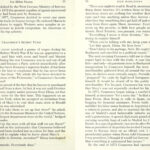Super Markets (or: Read It Monsieur and Learn Something About America)
Here’s a recent post of a book excerpt on the Ex Bird Site — brought to my attention thanks to Jesse Walker.
@petrifiedegg, Jul. 8
When Yeltsin saw a Texas supermarket, his worldview was revolutionised and he wept;[1] when Ceausescu saw Macy’s he just thought it was a fake.[2]
The attached page images from the post are an excerpt from Red Horizons, an expose written by Ion Mihai Pacepa (formerly acting head of the foreign intelligence service in the Romanian Securitate), after he defected to the United States:
Ceausescu has never received a penny of wages during his entire adult life. Before World War II he was an apprentice to a shoemaker, who paid him with room and board and Marxist indoctrination. During the war Ceausescu was in and out of jail as a Communist and became a Party activist immediately after its end. Since he has been Romania’s supreme leader,[3] it has been a matter of pride for him to emphasize that he has never been paid for what he has done.
My whole life has been devoted to the World Revolution of the Proletariat,is Ceausescu’s favorite definition of himself.Ceausescu is also proud of the fact that he has never purchased anything for himself from a store. In fact, it was not until October 1970 that Ceausescu, mainly under pressure from Elena,[4] set foot in a department store for the first time. This happened on an official visit to New York, when he accepted an invitation from the management of Macy’s to visit their main store at Herald Square. Ceausescu was astonished.
How long did it take them to set up that show?he asked, when he got back to the Romanian Mission to the United Nations.
Macy’s is the largest department store in the world,hedged a puzzled ambassador.
I mean, to fill up the store with all that stuff we saw there?It finally dawned on the ambassador that Ceausescu believed the whole store had been stocked just as a show for him, and the ambassador started to explain what he knew about Macy’s.
Do you subscribe to Scinteia, monsieur?Elena interrupted.
Of course, comrade. Everybody does.[5][78]
Then you ought to read it. Read it, monsieur, and learn something about America. It’s written there in black and white that American stores are nothing but window dressing, that Americans can’t buy anything unless they borrow money. And that after they buy something they get laid off and everything is taken away from them again. Show, monsieur. Everything is show, to cover up the poverty, to hide how people are sleeping in the streets. Read Scinteia, you peasant, you mascalzone![6]
Everything I know is from Scinteia,the ambssador said, trying to expiate himself.
When you’re talking with me, keep your mouth shut!
Let him speak, Elena. He lives here.
Don’t listen to his garbage, Nick. He ought to be sent back to Bucharest and enrolled in a political course.The next morning Ceausescu told me to check Macy’s out and report back to him with the truth. A year later he opened the first–and only–department store in Bucharest. On the day of its inauguration by Ceausescu himself, the store was chock full of merchandise gathered from all around the country. A few days later, its shelves were virtually empty. Periodically the store was
preparedfor visits by high-level foreigners or by Ceausescu himself. It would be closed off to the public and stuffed with merchandise. For his part, Ceausescu has never really believed that Macy’s was not especially stocked for his visits.— Lt. Gen. Ion Mihai Pacepa (1987), Red Horizons: The True Story of Nicolae and Elena Ceausescus’ Crimes, Lifestyle, and Corruption, pp. 77-78.
- [1][The poster is referring to a famous photograph of Boris Yeltsin’s 1989 visit to a Randalls supermarket in Clear Lake, Texas in 1989. Yeltsin was a Member of Parliament in the USSR, and he was making a diplomatic visit to the United States that included a tour of NASA in Houston. The stop at Randalls was an unscheduled side-trip at Yeltsin’s request; his handlers had to arrange an impromptu visit and the store’s managers found out that a VIP was coming about 15 minutes before Yeltsin arrived. During the visit, Yeltsin exclaimed to his interpreter,
Even the Politburo doesn’t have this choice. Not even Mr. Gorbachev.
Later in his memoirs, Yeltsin wroteWhen I saw those shelves crammed with hundreds, thousands of cans, cartons and goods of every possible sort, for the first time I felt quite frankly sick with despair for the Soviet people. That such a potentially super-rich country has been brought to a state of such poverty! It is terrible to think of it.
—R.G.]↩ - [2][Many such cases. When my father was studying for his Ph.D., one of the things he did for the Department was to help pick up the visiting scholars who were coming from the Soviet Union and Eastern Europe to give talks on campus. He’d pick them up from the airport in San Francisco, show them around for the afternoon and then get them settled in their hotel or get them to campus for their talk. What Dad would say is that every visiting scholar would ask him for the same two things during the afternoon: (1) they’d ask him to take them to see a genuine American ghetto, and (2) they’d ask to see an American grocery store. He’d try to beg off the first, but if they insisted enough, he’d drive through some of the rough neighborhoods in Oakland. These were a lot rougher in the 1960s and 1970s than they are now, but scholars from Communist countries typically were shocked, or they simply did not believe that the people in the neighborhood actually lived in the inner city apartment buildings that they were driving by, because they looked like the nicest apartment buildings you could get back home. For the second, he’d stop by a Safeway or a similar store that was convenient to get to. Most of them were amazed by what they saw in the store. Some refused to believe that he’d taken them to a real, ordinary grocery store; they insisted that these must be the fancy stores only for the fabulously wealthy, or even that they must be some kind of special Potemkin stores that the Americans kept to show off to visiting Communists for propaganda purposes. —R.G.]↩
- [3][Ceausescu took power after Gheorghe Gheorghiu-Dej died in 1965. This book was published in 1987, two years before the Christmas Revolution in Romania, which led to the downfall and execution of the Ceausescus. —R.G.]↩
- [4][Elena Ceausescu, née Lenuța Petrescu — the dictator’s Party comrade and wife. During the 1970s she was at the beginning of an ambitious effort to involve herself more actively alongside her husband in the regime’s propaganda and took an active role in the most powerful offices on the executive committee of the Communist Party. By the 1980s she had become a First Deputy Prime Minister and developed her own cult of personality. She was widely regarded as the second most powerful person in the state, and gained a widespread reputation in Romania as vain and rapaciously greedy. In 1989, she was arrested and executed alongside her husband in the downfall of the regime. —R.G.]↩
- [5][Scînteia (The Spark) was the official party newspaper of the Communist Party of Romania, modeled on the Bolshevik revolutionary paper Iskra and the Soviet Communist Party organ Pravda. —R.G.]↩
- [6][Italian; roughly,
rascal!
—R.G.]↩


